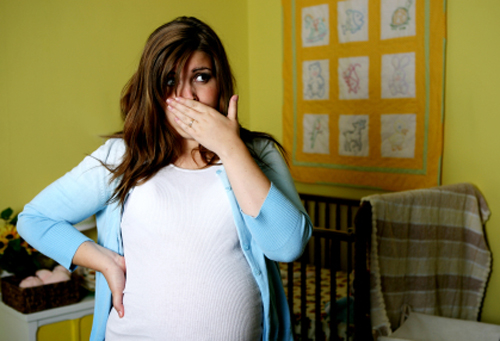Who hasn’t heard of morning sickness? Anytime a movie or television show features a character getting pregnant, morning sickness often plays a big role in that pregnancy. Despite the fact that everyone and their dog has heard of morning sickness, very few people know much about it. When does morning sickness start? What does it feel like? When does it end? Let’s talk a little but more about morning sickness and answer some of the most common questions mothers-to-be have about it.

When Does Morning Sickness Start?
This one is a big question a lot of women have when they’re trying to have a baby but it’s also a hard one to answer. The average time a mother-to-be starts experiencing morning sickness is around six weeks pregnant but like so many other things with pregnancy and motherhood, the answer varies dramatically from woman to woman. Some women find morning sickness starts right after they conceive. Others don’t get morning sickness at all. When or if you get morning sickness, you’ll really only get it when your body decides its time.

When Does Morning Sickness End?
This is another big one and it’s one a lot of women really, really want to know the answer to. If you’re experiencing morning sickness, you can probably understand why. Morning sickness sucks. Unfortunately, this is another hard to answer question because women will experience different things depending on their bodies. For the majority of women, morning sickness has stopped by the twelfth week of pregnancy.

Why Do Pregnant Women Experience Morning Sickness?
It’s a bit difficult to pinpoint the exact reason a woman experiences morning sickness when pregnant. There are a number of theories but few have actually been scientifically proven. The most common theory is the increased levels of estrogen in a pregnant woman’s body and the increased hormonal activity in general. Those hormones can cause a whole host of things to happen when a woman is pregnant and morning sickness is believed to be on that list.
Another common theory about what causes morning sickness is the theory that the very hormone that relaxes the muscles in your uterus and fights early childbirth (progesterone) also causes the body to release excess stomach acids. The reason for this is that while it relaxes the muscles in your uterus, progesterone also relaxes your stomach and intestines which can cause that excess stomach acid which in turn causes heartburn and nausea.
Many pregnant women experience a significantly heightened sense of smell. Even women who are not normally sensitive to smells may become nauseated by strong scents. That isn’t even necessarily limited to unpleasant smells. Scents you once loves – a shampoo, candle, flower, perfume – may suddenly become public enemy number one. Things usually go back to normal after you’ve given birth but even so, something as simple as a strong scent can send a pregnant woman scurrying for the bathroom.
The baby growing inside you is a miracle. No one could ever argue that. At the same time, the baby growing inside you, specifically the placenta protecting it, can be a huge drain on your body. The placenta draws energy from the mother-to-be and that can cause low blood sugar which can in turn cause nausea.
Morning sickness could also be a way for a pregnant woman’s body to protect Mommy and baby during the early stages of pregnancy. While pregnant, a woman’s immune system is weakened. The reasons for that are just as unverified as the reasons for morning sickness but the prevailing theory among most is that a woman’s immune system needs to be suppressed to make sure her body doesn’t reject the fetus. By throwing up, a woman would be getting rid of any harmful substances (bacteria, chemicals, parasites etc) that would normally be safe but could make a pregnant woman sick.

Is Morning Sickness Dangerous?
There is nothing pleasant about morning sickness but in general, it isn’t dangerous. In fact, morning sickness is often considered an indication that you’re having a healthy, normal pregnancy because morning sickness indicates the placenta is developing properly. You should let your doctor know what you’re experiencing though. If your morning sickness is especially problematic, your doctor may be able to offer you something to help with the nausea. If you’re experiencing excessive vomiting, however, you should alert your doctor right away, especially if you’re not able to keep any food down at all. You need to be sure you’re getting the right nutrients and vitamins to ensure your baby is getting the right nutrients and vitamins so that you can both be healthy. Excessive vomiting can also lead to dehydration so it’s best to consult your doctor to see if they are able to offer you anything to help.
Beyond the normal problems associated with excessive vomiting, when pregnant excessive vomiting can also be a symptom of a condition called hyperemesis gravidarum. While this is not a terribly uncommon condition among pregnant women, it is a condition that will require treatment. If you have this condition, your doctor will be able to diagnose you when you inquire about the excessive vomiting.
I cannot stress this next part enough – do not attempt to treat this on your own. If you are throwing up everything you eat, you need to see your doctor. It could be absolutely nothing and then you’ve nothing to worry about. Even if you have hyperemesis gravidarum, it’s not really all that serious. If it’s a mild case, you’ll need a little rest, antacids and will possibly need to make a few changes to your diet. More severe cases may require a short hospital stay while you replenish your fluids and get back on your feet.
Aside from throwing up everything you eat, you should also take a trip to see your doctor if you’re also experiencing a fever or pain along with the vomiting or if you’re still experiencing morning sickness after thirteen weeks pregnant. Again, it may be absolutely nothing but when it comes to your health and the health of your baby, it’s always better to be safe than sorry.

What Can I Do to Treat Morning Symptoms?
Unless you’re experiencing any of the symptoms I mentioned above that should send you to your doctor, you can treat basic morning sickness at home on your own. Here are a few suggestions that may help you:
- Avoid lying down after you’ve eaten.
- Avoid spicy foods.
- Eat several small meals a day and avoid skipping meals.
- Avoid drinking beverages with meals. Instead drink your beverages either half an hour before or half an hour after eating.
- Avoid any foods or scents that seem to make your nausea worse.
- Have someone else prepare meals for you and if the smell of food cooking upsets your stomach, go outside or open the windows to ventilate.
- Gets lots and lots of rest. Naps are your friend.
- Try to keep yourself cool and avoid places that are especially warm.
- Stock up on potato chips, pretzels or other salty foods. They can help settle your stomach before you eat a meal. Fun suggestion: have potato chips as a side dish (regular or original flavor) along with your meal.
- The smell of ginger or lemons can settle your stomach so try sniffing those.
- Drink lemonade to stay hydrated and settle your stomach.
- Watermelon makes a great, stomach friendly snack.
- Plain saltine crackers make a world of difference. Try eating a few before you even get out of bed. You might be surprised by how much better you’ll feel throughout the day.
If you’ve tried everything and your stomach is still upset but you’re not vomiting or experiencing any other symptoms, it’s still okay to go to your doctor to ask for help. While maybe not a medical emergency, feeling sick all the time is definitely no fun and isn’t much good if you’re trying to relax. Your doctor will understand and will want to help.
Helpful Resources :
http://www.americanpregnancy.org/pregnancyhealth/morningsickness.html
http://www.babycenter.com/morning-sickness
http://www.betterhealth.vic.gov.au/bhcv2/bhcarticles.nsf/pages/morning_sickness?open











